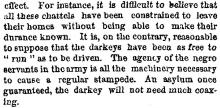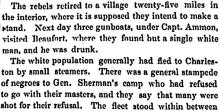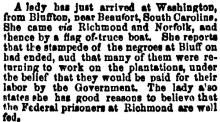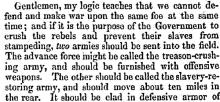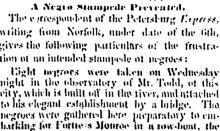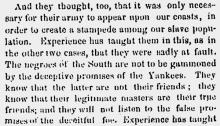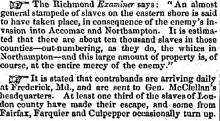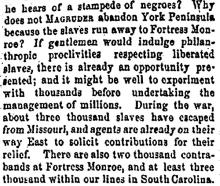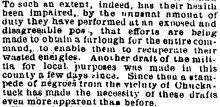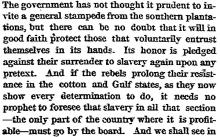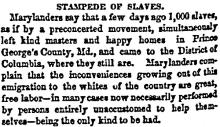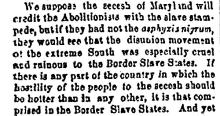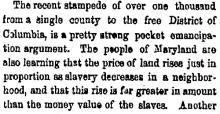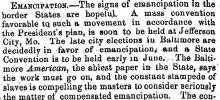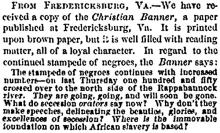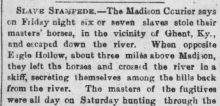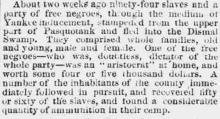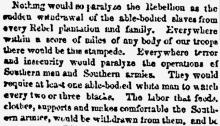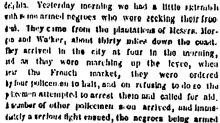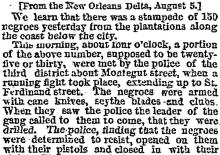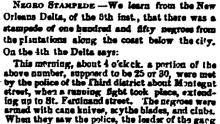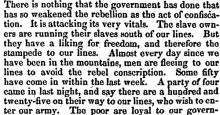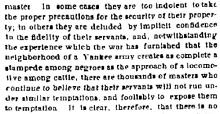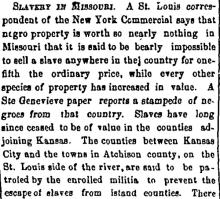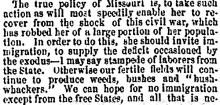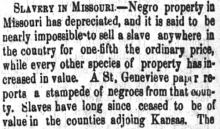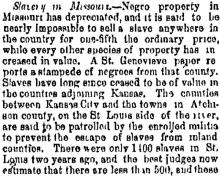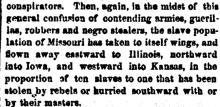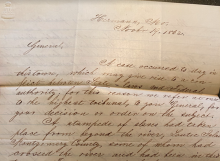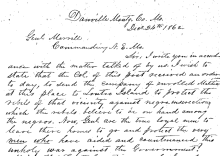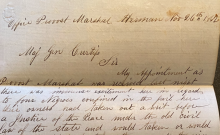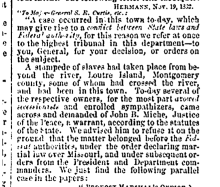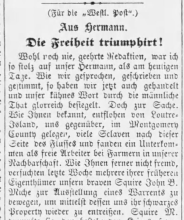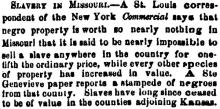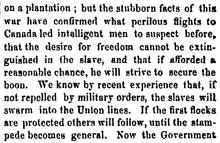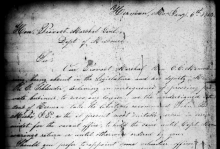View All Documents // 1840s // 1850s // 1860s
Displaying 1001 - 1050 of 1135
ARMY OF THE WEST.
FROM GEN. HUNTER'S COMMAND.
...The depredations of forage and provisions would have been patiently borne, but that there are a few Union men who own slaves, which was supposed to be a sort of sacred possession to the loyal. The visit of Gen. Lane has brushed away the fancied security. There is no doubt but that much of the Union sentiment of Missouri slaveholders is not deserving the name, as it is only an anchor for holding on to their negroes, but there are others whose love for the old flag springs from unselfish grounds. When Gen. Fremont returned to Tipton this week he took some sixty more negroes back with him than he brought. Nobody knew exactly where they came from, but the circumstance was regarded as suspicious.
THE WAR-EVENTS OF THE WEEK.
...The rebels retired to a village twenty-five miles in the interior, where it is supposed they intend to make a stand. Next day three gunboats, under Capt. Ammon, visited Beaufort, where they found but a single white man, and he was drunk.
The white population had fled to Charleston by small steamers. There was a general stampede of negroes to Gen. [Thomas] Sherman's camp who had refused to go with their masters, and they say that many were shot for their refusal. The fleet stood within between eight hundred and one thousand feet of the forts, and used five second fuses, pouring shell into the forts at the rate of two thousand an hour. Not a single shell sent by the rebels burst in a ship....
A lady has just arrived at Washington, from Bluffton, near Beaufort, South Caroline. She came via Richmond and Norfolk, and hence by a flag of-truce boat. She reports that the stampede of the negroes at Bluff on has ended, and that many of them were returning to work on the plantations, under the belief that they would be paid for their labor by the Government. The lady also states she has good reason to believe that the Federal prisoners at Richmond are well fed.
From the Leavenworth Conservative.
Jim Lane's Speech at Springfield, Missouri.
...Gentlemen, my logic teaches that we cannot defend and make war upon the same foe at the same time; and if it is the purpose of the Government to crush the rebels and prevent their slaves from stampeding, two armies should be sent into the field. The advance force might be called the treason-crushing army, and should be furnished with offensive weapons. The other should be called the slavery-restoring army, and should move about ten miles in the rear. It should be clad in defensive armor of triple steel; for such is the meanness of the spirit which is bred in the hearts of men by slave-breeding, slave-trading and slave-holding, that the masters would creep into every place of ambush and fire upon those who were gathering up and returning their fugitive human property....
SPEECH OF GEN. LANE.
...Gentlemen, my logic teaches that we cannot defend and make war upon the same foe at the same time; and if it is the purpose of the Government to crush the rebels and prevent their slaves from stampeding, two armies should be sent into the field. The advance force might be called the treason-crushing army, and should be furnished with offensive weapons. The other should be called the slavery-restoring army, and should move about ten miles in the rear. It should be clad in defensive armor of triple steel; for such is the meanness of the spirit which is bred in the hearts of men by slave-breeding, slave-trading and slave-holding, that the masters would creep into every place of ambush and fire upon those who were gathering up and returning their fugitive human property....
A Negro Stampede Prevented.
The correspondent of the Petersburg Express, writing from Norfolk, under date of the 6th, gives the following particulars of the frustration of an intended stampede of negroes:
THE SCHOOL OF EXPERIENCE.
The Yankees are engaged in learning a lesion in national affairs, which is likely to prove very costly to them. They believe that the South was full of Union men, and that, as the victorious armies of the North advance into the Cotton States, the “loyal” people would rise up, and welcome their “deliverers.” But the experience will teach them— indeed it has already taught them— that the only loyal people in the South are those who are loyal to the Confederate Government.
The Richmond Examiner says: "An almost general stampede of slaves on the eastern shore is said to have taken place, in consequence of the enemy's invasion into Accomac and Northampton. It is estimated that there are about ten thousand slaves in those counties––out-numbering, as they do, the whites in Northampton––and this large amount of property is, of course, at the entire mercy of the enemy."
...You made a remark in one of your last letters to which I want to reply. I should have done so before, but I have had no opportunity. The remark was this.—Jim Lane is worth both fo them speaking of Sherman and Ship Island Phelps, “though he be ‘a coward.’” Now you and seemingly all of the country are honest in this opinion. But I tell you it is a mistake. Genl. Sherman is a thorough soldier and in his operations in South Carolina he must be acting under orders only, for if he were not would he be allowed to remain in Command of the Federal Army? I think not. Were he ordered to take and burn Charleston or Savannah would he hesitate? Did Sherman’s Battery every refuse to do as they were ordered? Its well known reputation says no. So if Genl. Sherman was directed by Genl. McClellan to march on Manassas itself I believe he would do it in a manner becoming a soldier. Genl Phelps is perhaps a good deal of a nondescript. Would make a better private than a general.
Slavery and the War.
SALEM, O., Jan. 23, 1862.
[Correspondence of the Richmond Dispatch]
Camp News––Health of the Troops––Manufactures, &c., &c.
ISLE OF WRIGHT COUNTY, VA.,
February 1, 1862.
There is but little news from the camps in this county. There is but little sickness, and all are in buoyant spirits. General Colston is winning golden opinions from all with whom he comes in contact. Young Crowder, committed for murder of his comrade, Sturdivant, at Camp Pemberton, is in jail here awaiting further trial.
THE CONTRABANDS FLEEING.––For some reason, the slaves on the border are taking to Kansas at more than ordinary speed. Rev. M.E. Lard offers two hundred dollars reward, in the Gazette, for the recovery of a man and woman who ran away from him within the past three weeks.
Col. Howard also offers one hundred dollars to any one who will bring to him, "a very likely, light colored, mulatto girl, name Fanny, from fourteen to fifteen years of age."
Messrs. Pullin, Elder, and Stamper offer five hundred dollars reward for four negro men who ran away from them, taking four horses with them. Besides these another batch left this county last week, and quite a party have vamosed since last Sunday.
KANSAS AND THE CONTRABANDS.––To show the feeling with which Kansians behold the stampede of negroes from their masters, to the tender mercies of the citizens of that young State, we clip the following from the Leavenworth Times. While Secessionists fight the Government, this is a fair sample of the feeling with which the people of the free States on the border treat every effort of slaveholders to recover their property. Stop this war, let the Courts resume their functions and property will be recovered, under the Fugitive Slave Law.
Stampede of Slaves––We learn that between thirty and forty slaves, in the counties of Boone, Callaway, St. Charles and Montgomery, Missouri, have lately run away from their masters. The names and description of the runaways are in the hands of the police of this city.
Springfield (MA) Republican, " 'Indemnity for the Past and Security for the Future'," March 19, 1862
"Indemnity for the Past and Security for the Future."
STAMPEDE OF SLAVES.
Marylanders say that a few days ago, 1,000 slaves, as if by a preconcerted movement, simultaneously left kind masters and happy homes in Prince George's County, Md., and came to the District of Columbia, where they still are. Marylanders complain that the inconveniences growing out of this emigration to the whites of the country are great, free labor––in many cases now necessarily performed by persons entirely unaccustomed to help themselves––being the only kind to be had.
WASHINGTON SPECIAL DESPATCHES.
A SLAVE STAMPEDE.
OUTRAGES IN WEST VIRGINIA.
TWO TOWNS BURNT BY GUERILLAS.
WASHINGTON, May 16.
The Tribune states that Marylanders say that a few days ago 1000 slaves, as if by a preconcerted movement, left their happy homes in Prince George's county, Md., and came to the District of Columbia, where they still are.
Slave Stampede.
[Baltimore Correspondence N.Y. Post]
There is no longer any doubt, that the slave stampede from this State is sweeping hundreds out of bondage. One neighborhood in Prince George's has lost twenty-seven, and it is thought that not less than three hundred have escaped from that region of moral darkness. Masters are therefore beginning to consider seriously the question of compensated emancipation.
EMANCIPATION MOVEMENTS.
The revolution has commenced and must go on. In Delaware, Mr. Fisher has entered the field for re-election to Congress on the emancipation issue. He will be bitterly opposed by the influence of Senators Bayard and Saulsbury and their secession sympathizers, and may be defeated in the present contest. That the emancipation policy of President Lincoln will triumph in Delaware in the end, has almost become one of the "fixed facts." Agitation of the subject has commenced, and discussion will hasten the work of giving freedom to the State.
Summary of News.
In the recent severe naval engagement at Fort Pillow, the rebel ram Louisiana being in close quarters with the United States Steamer Cincinnati, the crew proposing to board her, a new mode of warfare was adopted. The steam batteries of the Cincinnati commenced to throw steam and hot water into the midst of the rebel crew, which compelled them speedily to withdraw.
The slave stampede from Maryland is sweeping hundreds out of bondage. One neighborhood in Prince George's has lost twenty-seven, and it is though that not less than three hundred have escaped from that region of moral darkness. Masters are therefore beginning to consider seriously the question of compensated emancipation.
EMANCIPATION. – The signs of emancipation in the border States are hopeful. A mass convention favorable to such a movement in accordance with the President’s plan, is soon to be held at Jefferson City, Mo. The late city elections in Baltimore are decidedly in favor of emancipation, and a State Convention is to be held early in June. The Baltimore American, the ablest paper in the State, says the work must go on, and the constant stampede of slaves is compelling the masters to consider seriously the matter of compensated emancipation. The constant development of Union feeling in Nashville, and the bug meeting held there last week, are also very encouraging signs. In the District of Columbia the freedmen have not yet cut their master’s throats, and emancipation is working finely.
–A slave revolt and stampede is anticipated in Crittenden county, Arkansas, opposite Memphis, and many of the white are fleeing to Memphis for safety.
FROM FREDERICKSBURG, Va. – We have received a copy the Christian Banner, a paper published at Fredericksburg, Va. It is printed upon brown paper, but it is well filled with reading matter, all of a loyal character. In regard to the continued stampede of negroes, the Banner says:
The stampede of negroes continues with increased numbers— on last Thursday one hundred and fifty crossed over to the north side of the Rappahannock river. They are going, going, and will soon be gone. What do secession orators say now? Why don’t they make speeches, delineating the beauties, glories, and excellence of secession? Where is the immovable foundation on which African slavery is based?
SLAVE STAMPEDE.––The Madison Courier says on Friday night six or seven slaves stole their masters' horses, in the vicinity of Ghent, Ky., and escaped down the river. When opposite Eagle Hollow, about three miles above Madison, they left the horses and crossed the river in a skiff, secreting themselves among the hills back from the river. The masters of the fugitives were all day on Saturday hunting through the hills for them, but without success until about nine o'clock at night, when they were overtaken, steering northward, under the guidance of two young negroes, named Harris, who live in the vicinity. A brisk fight immediately ensued, in the confusion of which all the men of the party affected their escape, leaving the only woman of the party in the hands of her master. No one was seriously damaged.
YANKEE DEPREDATIONS IN EASTERN NORTH CAROLINA.
HEADQUARTERS ARMY OF THE SOUTHWEST,
Helena, Ark., July 31, 1862.
...I have given free papers to negroes who were mustered by their rebel masters to blockade my way to my supplies. These negro prisoners were the most efficient foes I had to encounter; they are now throwing down their axes and rushing in for free papers. It is creating a general stampede in this region of cotton and contempt for Yankees. The slaves are mutinous, but do not abuse their masters. Society is terribly mutilated, and masters and slaves are afraid of famine....
Yankee Raids in North Carolina––Arrest of Citizens––Stampede of Negroes.
From the Richmond Enquirer, July 31st.
During the past three or four weeks those counties in North Carolina bordering upon the Virginia lines of the Federal army have been subjected to a series of the most dastardly and vindictive guerrilla raids that have yet characterized the war in that quarter. The counties of Pasquotank, Camden, Currituck, and Gates have suffered the most severely from arrests of many of their principle citizens, robberies and burnings of property, and the incitement of negroes to revolt and escape.
FROM NEW-ORLEANS
THE SLAVE-CATCHING BUSINESS LIVELY.
Secession Jailers and Union Prisoners.
RECRUITING EASY.
LYDIA THE SLAVE.
Correspondence of The N.Y. Tribune.
NEW-ORLEANS, July 27, 1862.
A Negro Stampede––Sharp Conflict Between Policemen and Runaway Negroes.
From the New Orleans papers of the 4h and 5th inst., brought to this city by the [illegible], we extract the following additional items of news:––
NEGRO STAMPEDE––DEADLY WEAPONS USED––DESPERATE CONFLICT BETWEEN POLICEMEN AND NEGROES
[From the New Orleans Delta, August 5.]
We learn that there was a stampede of one hundred and fifty negroes yesterday from the plantations along the canal below the city.
INTERESTING FROM NEW ORLEANS.
Negro Stampede---Deadly Weapons Used--Desperate Conflict Between Policemen and Negroes.
[From the New Orleans Delta, August 5.]
We learn that there was a stampede of one hundred and fifty negroes yesterday form the plantations along the canal below the city.
NEGRO STAMPEDE— We learn from the New Orleans Delta, of the 5th inst., that there was a stampede of one hundred and fifty negroes from the plantation along the coast below the city. On the 4th the Delta says:
From the St. Mary's (Md) Beacon.
WHEN WILL IT TERMINATE.
LETTER FROM AN ARMY CHAPLAIN.
The following is an extracted from the letter of an army chaplain, dated camp near, Russelville, Alabama, August 22, 1862: —
THE CHARACTER OF THE WAR.
Tell us no more that America is without a history on which to rear a national literature or art. In less than two years the nation has made for itself a history, as full of interest, glory and romance as any on record. Now it seems to be reaching a climax, in the proclamation of freedom to the slave. What vista is that might deed destined to open before us? Many argue that the proclamation will be a nullity. But with or without the proclamation, the work of exterminating slavery is already progressing. Here, for instance, is an extract from the Richmond, Va., Dispatch of September r2:
SLAVERY IN MISSOURI. A St. Louis correspondent of the New York Commercial says that negro property is worth so nearly nothing in Missouri that it is said to be nearly impossible to sell a slave anywhere in the country for one-fifth the ordinary price, while every other species of property has increased in value. A Ste. Genevieve paper reports a stampede of negroes from that country. Slaves have long since ceased to be of value in the counties adjoining Kansas. The counties between Kansa City and the towns in Atchison county, on the St. Louis side of the river, are said to be patrolled by the enrolled militia to prevent the escape of slaves from island counties. There were only fourteen hundred slaves in St. Louis two years ago, and the best judges now estimate that there are less than five hundred, and these principally old decripid house servants. One of Gen.
ADDRESS OF HENRY B. BOUTON.
To the Voters of the Sixth Congressional District for the State of Missouri.
FELLOW-CITIZENS: I propose to represent you in the next Congress of the United States. This proposition is offered in some confidence, that my political antecedents, which run through a period of twenty-one years residence in this State; as also the relations I sustain to the present administration, and the dominant party in Congress, may afford me, to some extent, superior facilities for efficient service in that department. In times like these, the Representative should occupy no equivocal position.
EVENING DESPATCHES
Received from 8 P.M. to 11 P.M.
Important from the Potomac
Pleasanton and Burnside Moving.
ACTIVE MOVEMENTS ON FOOT.
From Fortress Monroe.
Late Southern News
Rebels Threatening Helena
GREAT FIRE IN ST. LOUIS
Five Steamers Burned
PHILADELPHIA, Oct. 27.
SLAVERY IN MISSOURI. – Negro property in Missouri has depreciated, and it is said to be nearly impossible to sell a slave anywhere in the country for one-fifth the ordinary price, while every other species of property has increased in value. A St. Genevieve paper reports, a stampede of negroes from the county. Slaves have long since ceased to be of value in the counties adjoing [adjoining] Kansas. The counties between Kansas City and the towns in Atkinson county on the St. Louis side of the river, are said to be patrolled by the enrolled militia to prevent the escape of slaves from inland counties. There were only fourteen hundred slaves in St. Louis two years ago, and the best judges estimate that there is less than five hundred, and these principally old and decrepit house servants. [From New Orleans Delta]
November the 3 [1862] M S Mr Wallace and Alfred at the farm to day. Mr Wallace expects to lose his overseer. The future prospect for farmers is dulle. It is thought there will be a general stampeed of negroes at Christmass....
...No[vember] the 8, 1862
Mr Wallace returned from the farm, a large body of caveldry passed guarding waggons going out for provisions. Great apprehensions felt by slave owners. The slaves in large nunbers are constantly making their escape to different divisions of the federal army. [struck through: They are however frequently returned to their owners.]
Slavery in Missouri. – Negro property in Missouri had depreciated, and it is said to be nearly impossible to sell a slave anywhere in the country for one-fifth the ordinary price, while every other species of property has increased in value. A St. Genevieve paper reports, a stampede of negroes from the county. Slaves have long since ceased to be of value in the counties adjoing [adjoining] Kansas. The counties between Kansas City and the towns in Atkinson county on the St. Louis side of the river, are said to be patrolled by the enrolled militia to prevent the escape of slaves from inland counties. There were only 1400 slaves in St. Louis two years ago, and the best judges estimate that there is less than 500, and these principally old and decrepit house servants.
The Missouri Elections––Emancipation in the Border Slave States.
The emancipationists have carried four or five of the nine members returned for Congress from Missouri by the late elections of that state. The same party have made a vigorous effort for the State Legislature, and they have almost succeeded in securing it against the hitherto invincible democracy. These results indicate a political revolution as remarkable as that which has just overthrown the republican radicals in New York; but wit a little inquiry into the subject it will be seen that the people of Missouri, in the election of these emancipation members to Congress, have by no means endorsed the slavery exterminating policy of the abolition radicals, but the widely different schema of President Lincoln's compensative emancipation, and for very good reasons.
General,
A case occurred to-day in this town, which may give rise to a conflict between State laws and Federal authority; fo this reason we refer at once to the highest tribunals to your Generals for your decision or order on the subject
A stampede of slaves had taken place from beyond the river, Loutre Island, Montgomery County, some of whom had crossed the river and had been in this town. To-day several of the respective owners, for the most part avowed secessionists and enrolled sympathizers came cross and demanded of John B. Miché, Justice of the Peace, a warrant, according to the Statutes of the State. We advised him to refuse it on the ground that the matter belonged before the Federal authorities under the order declaring martial law over Missouri and under subsequent orders from the President and Department Commanders...
Maj Gen Curtis
Sir,
My Appointment as Provost Marshal was received last night there was immense excitement here in regard to four Negroes confined in the jail here their owners had taken out a writ before a Justice of the Peace under the old civil law of the state and would taken or would have attempted to take them across the river the citizens had turned out and would have broken open the jail and freed the Negroes but for your timely dispatch I upon the receipt of the dispatch issued an order and they were turned loose by the Dept Sheriff they are here in the immediate Neighborhood will in all probability go to work for Union men by the month I will state my reasons for turning them loose
SLAVE-CATCHING AT HERMANN.
Full Details of the Transaction––
General Curtis Refuses to Release the Fugitive Slaves.
HERMANN, MO., Nov. 26
Editors Missouri Democrat:––Opposite the town of Hermann, in Gasconade County, is Loutre Island, an exceedingly fertile bottomland, occupied by slave owners. The property of these had conceived the idea of emancipation, and had stampeded accordingly. The recent election triumphs of the Democracy inspired the slave barons with new courage, and they followed their chattels even into German Gasconade with foul intent. The following letter tells the sequel:
"HERMANN, NOV. 19, 1862.
For the “Westliche Post”
From Hermann.
Freedom triumphs!
Never before, dear editors, have I been as proud of our Hermann as I am today. As we spoke, wrote and voted, so we have now acted and gloriously sealed our bold word through manly deeds.
But to the point. As you know, from Loutre Island opposite us, situated in Montgomery County, many slaves fled to this side of the river, and found lodgings, that is, as free laborers, with farmers in our neighborhood. As is also well known to you, last week several of your former owners tried to persuade our good squire John B. Miche to issue a warrant in order to wrest their black property from us again. Squire M. duly trumped them, in accordance with the existing laws of war and his duty as a Republican, and let them go their ways in a rage and snarling vengeance.
Reported Capture of a Supply Train––Movements of the Frontier Army––An Interesting Fugitive Slave Case––Political Matters––Thanksgiving-Day, &c., &c.
From Our Special Correspondent.
ST. LOUIS, Nov. 29, 1863
SLAVERY IN MISSOURI. – A St. Louis correspondent of the New York Commercial says that negro property is worth so nearly nothing in Missouri that it is said to be nearly impossible to sell a slave anywhere in the country for one fifth the ordinary price, while every other species of property has increased in value. A Ste Genevieve paper reports a stampede of negroes from that county. Slaves have long since ceased to be of value in the counties adjoining Kansas.
THE FREEDOM PROCLMATION.
Hermann, Mo. Jany. 6th 1863.
Hon. Provost Marshal Genl }
Dept of Missouri
Sir:
Our Provost Marshal Hon. C.C. Manwaring being absent in the Legislature and his deputy, Mr R.C. [illegible] declining in consequence of pressing private business to serve any longer, we the undersigned citizens of Herman take the liberty to reccomend John B. Miche, J.P., as the at present most [illegible] person in our midst for the vacant office; to hold the same until Capt. Manwaring's return or until otherwise ordered by you.
Should you prefer to appoint some volunteer officer to special duty here we shall of course cheerfully submit and regard this recommendation as void.
Very respectfully
K Kilker Wm Wesselhoeft
Wm Poeschel.

